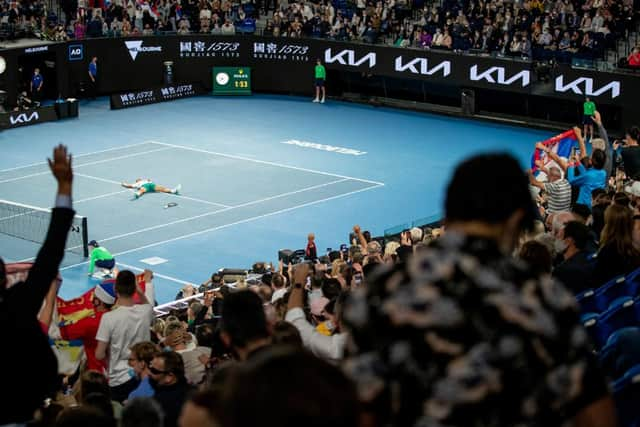Australian Open booing: why did fans boo at tennis tournament - and the government's response
Fans at the Australian Open have been criticised by the country’s government after they loudly booed the mention of the Covid-19 vaccine programme.
Deputy Prime Minister Michael McCormack branded the crowd's behaviour as "disgusting".
It comes as the country begins its national jabs rollout.


Advertisement
Hide AdAdvertisement
Hide AdMen’s number one player Novak Djokovic won the Grand Slam tournament’s final against Russian Daniil Medvedev on Sunday 21 February.
So, why did fans boo mention of the vaccine rollout - and how did the government respond?
Here is everything you need to know.
Why did fans boo at the Australian Open?
The loud chorus of booing broke out at the Australian Open during an awards ceremony following the men’s final.
Tennis Australia’s president Jayne Hrdlicka referred to the global Covid-19 vaccine rollout as a sign of “hope and optimism” during her address.
She said: “It's been a time of deep loss and extraordinary sacrifice for everyone. With vaccinations on the way, rolling out in many countries around the world, it's now a time for optimism and hope for the future.”
After the mention of the jabs programme, boos could be heard coming from the crowd.
The noise echoed across the stadium and forced Ms Hrdlicka to stop her speech.
However, the booing quickly faded and was replaced by loud applause and cheers.
Advertisement
Hide AdAdvertisement
Hide AdBut the crowd also booed Ms Hrdlicka’s mention of the Victorian state government as she thanked authorities for making the tennis tournament happen.
It came after fans missed the live action of the Grand Slam competition when the government implemented a five-day lockdown following a coronavirus outbreak at a quarantine hotel.
Ms Hrdlicka finished her speech by saying: “You are a very opinionated group of people.”
In Australia, the vaccine rollout has been broadly supported but it has recently sparked protests in some areas of the country.
How did the Australian Government respond?
Following the booing, Deputy Prime Minister Michael McCormack condemned fans’ behaviour, calling it “un-Australian”.
He told reporters: "I don't like booing at any event, and certainly any sporting event.
"This vaccine is going to get our country back to some sort of pre-Covid normality.”
Australia’s prime minister Scott Morrison was among the first in the country to receive his jab on Sunday 21 February.
Advertisement
Hide AdAdvertisement
Hide AdHe broadcasted his inoculation in an effort to boost national confidence in the vaccinations programme.
Where have there been anti-vaccine protests?
Small crowds of anti-vaccine demonstrators protested in Melbourne, Sydney and Brisbane on Saturday 20 February against the jabs rollout.
Some participants chanted slogans such as: "My body, my choice."
The majority of the protests were peaceful, but police made several arrests in Melbourne, according to local media reports.
Getting vaccinated is not mandatory in Australia but it is highly recommended by health authorities.
It is thought that the delay of the vaccine rollout in Australia, compared to other Western countries, could have led to a small increase in people who may be sceptical about receiving it.
The first stage of the country’s jab programme began on Monday 22 February.
Frontline, health and quarantine workers are first in line to receive a dose of the Pfizer-BioNTech vaccine.
Advertisement
Hide AdAdvertisement
Hide AdThe country aims to inoculate four million people, roughly a sixth of the population, by early March.
How many Covid cases are there in Australia?
At the time of writing, Australia had under 40 active coronavirus cases in the country.
Most of those were within its strict hotel quarantine programme.
In total, the nation has recorded around 29,000 cases since the pandemic began, while there have been about 909 Covid-19 deaths.
These numbers are far fewer than many other Western nations.